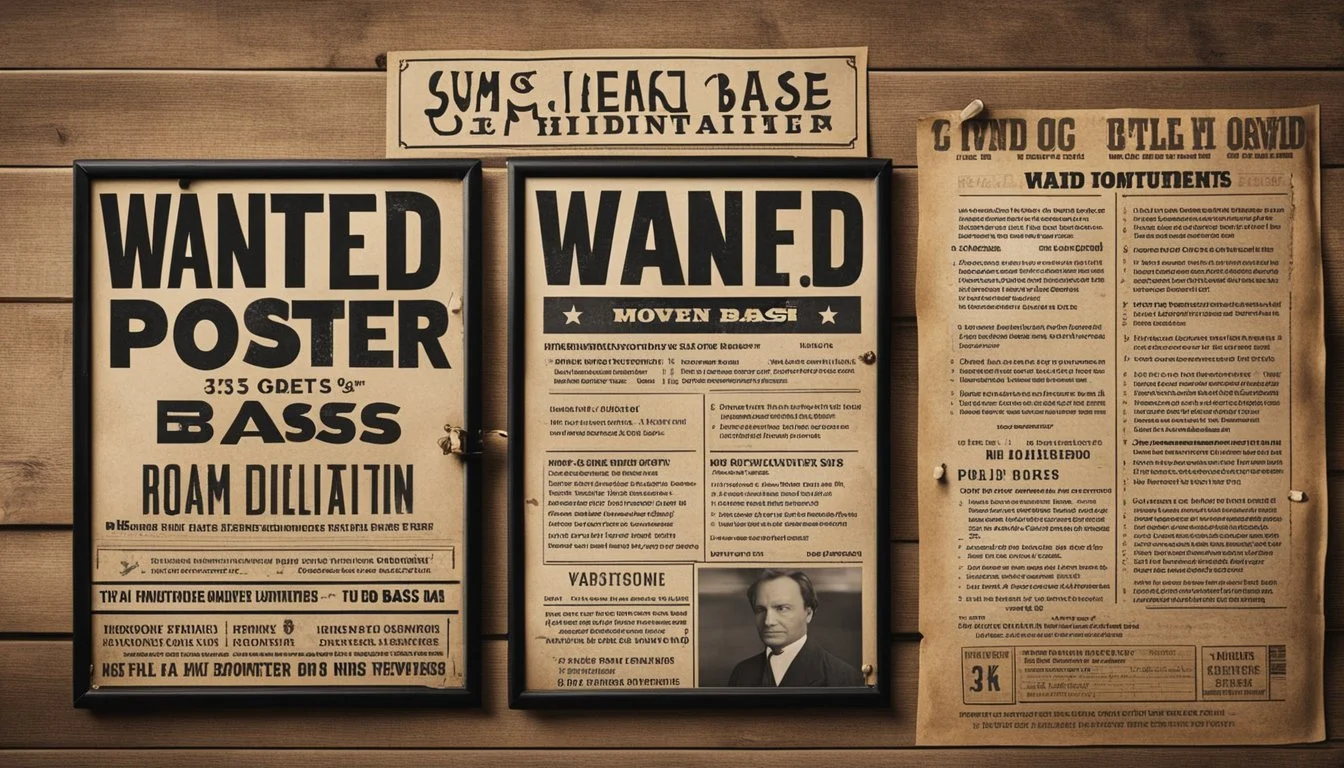6 Sam Bass Documentaries That Chronicle His Short-Lived Crime Spree
Exploring the Wild West Outlaw's Brief but Notorious Career
Sam Bass, the infamous 19th-century American outlaw, left an indelible mark on Texas history during his brief criminal career. His daring train robberies and escapades captivated the public imagination, turning him into a folk hero for some and a notorious criminal for others.
Several documentaries have been produced to explore the life and crimes of Sam Bass, offering viewers a glimpse into his short-lived but impactful crime spree. These films provide valuable insights into the historical context, motivations, and consequences of Bass's actions, shedding light on a fascinating chapter of the American Wild West.
1) Sam Bass: The Texas Legend
Sam Bass became a notorious outlaw in Texas during the 1870s. His short but infamous crime spree captured the public's imagination and cemented his place in Wild West lore.
Bass started as a small-time horse thief before graduating to more ambitious heists. In 1877, he and his gang pulled off the first train robbery in Texas history near Allen.
The daring train robberies continued, with Bass targeting the lucrative shipments of gold and cash traversing the state by rail. His exploits made headlines and earned him a reputation as a charismatic bandit.
Law enforcement struggled to catch the elusive Bass as he utilized hideouts like Pilot Knoll near present-day Lewisville Lake. The Texas Rangers eventually tracked him down in Round Rock in 1878.
Though his criminal career lasted only a few years, Bass left an outsized legacy. He became the subject of folk songs, dime novels, and legends that painted him as a Robin Hood figure.
Learn more about Sam Bass on Wikipedia
2) Outlaw Sam Bass: An American Bandit
Sam Bass was a notorious train robber and outlaw in 19th-century America. Born in Indiana in 1851, he moved to Texas in his early twenties where he began his life of crime.
Bass gained fame for his daring train robberies, including a Union Pacific heist in Nebraska that netted $60,000 in gold. This remains one of the largest train robberies in U.S. history.
The Texas Rangers pursued Bass relentlessly across the state. He managed to evade capture for months, earning a reputation as a skilled fugitive.
Bass met his end in a shootout with Texas Rangers in Round Rock on July 19, 1878. He died two days later on his 27th birthday, refusing to name his accomplices even on his deathbed.
Though his criminal career lasted only a few years, Sam Bass became a legendary figure in Wild West folklore. His exploits inspired numerous stories, songs, and films about his brief but eventful life as an outlaw.
3) The Life and Crimes of Sam Bass
Sam Bass was born on July 21, 1851, in Indiana. He left home at 18 and made his way to Texas, where he began his life of crime.
Bass initially worked as a cowboy and teamster. In 1876, he and Joel Collins drove cattle north but turned to robbing stagecoaches after losing their earnings gambling.
In 1877, Bass and his gang achieved notoriety by robbing a Union Pacific train in Nebraska. They stole $60,000 in gold, making it one of the largest train robberies in American history.
Bass returned to Texas, where he continued robbing trains and stagecoaches. His exploits gained him a reputation as a folk hero among some Texans.
The Texas Rangers pursued Bass relentlessly. On July 21, 1878 - his 27th birthday - they cornered him in Round Rock, Texas. In the ensuing shootout, Bass was mortally wounded.
Despite his short-lived criminal career, Sam Bass left a lasting impact on Texas folklore. His daring robberies and dramatic end cemented his place in Wild West legend.
Learn more about Sam Bass on Wikipedia
4) Sam Bass: Texas' Infamous Train Robber
Sam Bass gained notoriety as one of Texas' most infamous train robbers in the late 1870s. Born in Indiana in 1851, Bass moved to Texas in his early twenties and embarked on a life of crime.
Bass formed a gang that specialized in robbing trains. Their most lucrative heist occurred in 1877 when they stole $60,000 in gold from a Union Pacific train in Nebraska.
The Bass Gang's success was short-lived. Law enforcement intensified efforts to capture the outlaws, forcing them to constantly move and evade authorities.
Bass met his end in Round Rock, Texas, on July 21, 1878 - his 27th birthday. He died following a shootout with Texas Rangers, bringing his brief but infamous criminal career to a close.
Despite his short life, Sam Bass left a lasting mark on Texas folklore. His daring train robberies and dramatic demise cemented his place in Wild West history.
5) Sam Bass and the Round Rock Heist
Sam Bass's final heist attempt in Round Rock, Texas marked the end of his brief outlaw career. In July 1878, Bass and his gang planned to rob the Williamson County Bank in Round Rock.
Local law enforcement, tipped off about the impending robbery, prepared an ambush. On July 19, a shootout erupted on the streets of Round Rock when Bass and his companions were confronted by Texas Rangers and local deputies.
During the gunfight, Bass was shot and severely wounded. He managed to escape initially but was found the next day, gravely injured. Bass was brought back to Round Rock, where he died on July 21, 1878 - his 27th birthday.
The failed Round Rock heist and its violent aftermath effectively ended Sam Bass's short-lived crime spree. This dramatic incident has been portrayed in various films and documentaries, capturing the public's fascination with the notorious outlaw's final days.
Learn more about Sam Bass and the Round Rock shootout
6) Sam Bass: The Infamous Texas Outlaw Chronicles
Sam Bass: The Infamous Texas Outlaw Chronicles (2015) offers a detailed look at the short but eventful life of Sam Bass. This documentary follows Bass's transformation from a simple farm hand to a notorious outlaw.
The film explores Bass's early days in Indiana and his move to Texas in 1870. It recounts his time as a teamster and his initial forays into horse racing, which eventually led him down a criminal path.
Bass's most famous exploit, the Big Springs robbery of 1877, is given particular attention. The documentary details how Bass and his gang stole $60,000 in gold from a Union Pacific train in Nebraska.
The film also covers Bass's time hiding out in Denton County, Texas. It describes how he evaded capture for months, gaining a reputation as a Robin Hood figure among some locals.
Bass's final days and his dramatic shootout with Texas Rangers in Round Rock are vividly portrayed. The documentary concludes with an examination of Bass's lasting legacy in Texas folklore.
The Infamous Rise of Sam Bass
Sam Bass transformed from a small-town farmhand into one of the most notorious train robbers in American history. His rapid ascent to outlaw infamy began in Texas and culminated with a daring $60,000 heist that put him firmly in the crosshairs of law enforcement.
Early Life and Background
Sam Bass was born on July 21, 1851 in Indiana. Orphaned at a young age, he moved to Texas as a teenager seeking opportunity. Bass initially found work as a farmhand and teamster in Denton County.
His early years were marked by restlessness and a desire for adventure. Bass developed a passion for horses and racing, which would later influence his criminal activities.
In 1870, Bass befriended Scott Mayes, a teamster headed to Texas. This connection proved pivotal in Bass's decision to settle in the Lone Star State.
Initial Forays into Crime
Bass's criminal career began with horse theft and small-scale robberies in Texas. He assembled a gang of outlaws and started targeting stagecoaches and trains.
His first major heist occurred in 1877 when he and his gang robbed a stagecoach in the Black Hills of South Dakota. This success emboldened Bass to attempt larger, more daring robberies.
Bass's notoriety grew rapidly. He evaded capture multiple times, frustrating law enforcement efforts. The Texas Rangers formed a special unit dedicated to apprehending Bass and his gang.
His criminal exploits reached their peak in 1878 with the infamous Union Pacific train robbery in Big Springs, Nebraska. Bass and his gang made off with $60,000 in gold coins.
Notable Heists and Pursuits
Sam Bass's brief criminal career was marked by two particularly daring robberies that captured public attention. These heists demonstrated his audacity and skill as an outlaw, while also leading to intense pursuits by law enforcement.
The Round Rock Heist
In 1878, Sam Bass and his gang attempted to rob the Williamson County Bank in Round Rock, Texas. They cased the bank for several days, planning a swift strike. On July 19, Bass and two accomplices entered the bank, guns drawn.
However, their plan quickly unraveled. A local deputy recognized the outlaws and raised the alarm. A fierce gunfight erupted in the streets. Bass was shot and seriously wounded during the escape.
Though he initially evaded capture, Bass's injury proved fatal. He was found dying in a field outside town the next day. The failed Round Rock heist marked the dramatic end of Sam Bass's outlaw career.
The Union Pacific Train Robbery
On September 18, 1877, Sam Bass and his gang pulled off their most infamous heist - robbing a Union Pacific train at Big Springs, Nebraska. The gang boarded the train as it stopped to take on water.
They quickly overpowered the crew and forced their way into the express car. There, they found a massive shipment of newly minted gold coins worth $60,000 (equivalent to over $1.5 million today).
The gang escaped into the night with their massive haul. This robbery was considered the largest single train heist in U.S. history at the time. It catapulted Sam Bass to national notoriety and sparked an intensive manhunt across multiple states.




